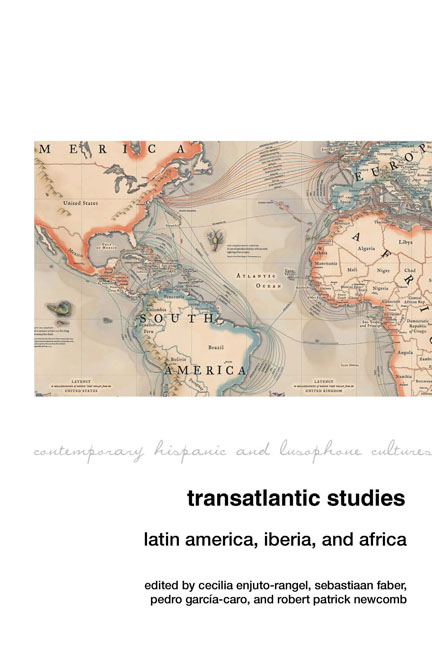Book contents
- Frontmatter
- Contents
- Introduction: Transatlantic Studies: Staking Out the Field
- Transatlantic Methodologies
- Transatlantic Linguistic Debates
- Transatlantic Displacement
- Transatlantic Memory
- Transatlantic Postcolonial Affinities
- Transatlantic Influence
- Epilogue: The Futureâif There Is OneâIs Transatlantic
- Index
8 - Inscribing Islands: From Cuba to Fernando Pó and Back
- Frontmatter
- Contents
- Introduction: Transatlantic Studies: Staking Out the Field
- Transatlantic Methodologies
- Transatlantic Linguistic Debates
- Transatlantic Displacement
- Transatlantic Memory
- Transatlantic Postcolonial Affinities
- Transatlantic Influence
- Epilogue: The Futureâif There Is OneâIs Transatlantic
- Index
Summary
La remota (según desde donde se mire, claro) isla de Annobón, una especie
de volcán selvático perdido en el Atlántico, es el finis terrae más ignoto,
acaso el más misterioso también, del mundo que se expresa en español
[…] En las selvas y playas de Annobón. desde cuyas alturas no pueden
contemplarse otros horizontes que los del infinito y fronterizo mar, hunden
sus raíces la familia y la cultura de Juan Tomás Ávila Laurel […] A él le ha
correspondido ser el cronista trasterrado de Annobón, como Derek Walcott
[…] lo es de Santa Lucía, como Seamus Heaney […] lo es de Irlanda, como
V.S. Naipaul […] lo es de Trinidad, como la inspirada Edwidge Danticat lo
es de Haití. O como el delicadísimo poeta Jean-Joseph Rabearivelo lo fue,
a comienzos del siglo XX, de Madagascar, o como el inmenso, incalculable
narrador Pramoedya Ananta Toer lo fue […] de Java y de Indonesia. A todas
estas exóticas mitologías literarias isleñas, que parecen estar construidas
[…] desde islas que se hallan en el espacio liminal que queda entre el
mar y la nada, es preciso sumar desde ahora la isla de Annobón […] Isla
ardiente en medio del mar de Atlante, jalón inesperado en los varios
océanos de la literatura moderna en lengua española. (Pedrosa, 2009)
[The island of Annobón—remote (depending, of course, on where one is
looking from)—is a kind of forested volcano lost in the Atlantic, and the most
unknown finis terrae, perhaps the most mysterious too, of the Spanish-speaking
world (…) It is in the forests and beaches of Annobón, from whose heights
one can see no horizons other than those of the infinite frontier ocean, that
the roots of the family and culture of Juan Tomás Ávila Laurel are buried (…)
It has befallen him to be the exiled chronicler of Annobón, as Derek Walcott
(…) is for St. Lucia, as Seamus Heaney (…) is for Ireland, as V.S. Naipaul (…)
is for Trinidad, and the inspired Edwidge Danticat is for Haiti. Or as the
consummately refined poet Jean-Joseph Rabearivelo was (…) for Madagascar,
or as the immense, incalculable, narrator Pramoedya Ananta Toer was
(…) for Java and Indonesia.
- Type
- Chapter
- Information
- Transatlantic StudiesLatin America, Iberia, and Africa, pp. 99 - 114Publisher: Liverpool University PressPrint publication year: 2019

